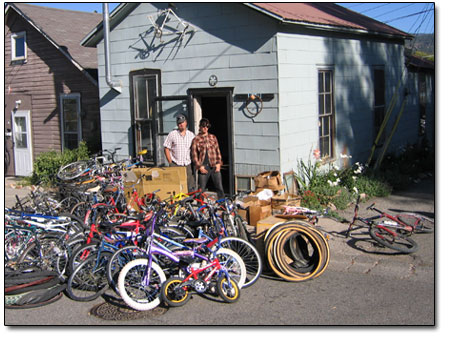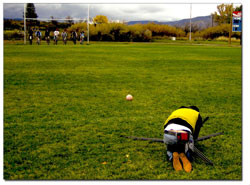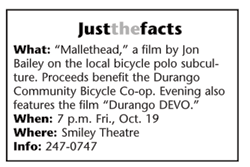| ||||||
| Bicycle Co-op takes off New hub for local bicycle community in the works SideStory: ‘Mallethead,’ the movie: Local film pays homage to bike polo
by Missy Votel When it comes to certain things, Durangoans can be generous to a fault. Russell Zimmerman, owner of the Durango Cyclery, learned this firsthand when a call for old bikes and bike parts for the Mr. Smylie Bike Project resulted in an avalanche of donations. “It was a daily occurrence that I would come out of the store, and there would be two or three bikes sitting in front of the store,” said Zimmerman. He and mechanics Bob Gregorio and Jon Bailey launched the program, which rehabilitated the stockpile of bikes belonging to the late Melvin Smylie, earlier this summer. Since that time, they have given away close to 100 bikes, including all of Smylie’s. However, the store has also amassed close to 200 bikes in various states of disrepair, which filled a rented storage space across the alley as well as Bailey’s garage and yard. And therein lies the dilemma. “The demand was tremendous but we just can’t keep working on bikes and giving them away for free,” said Zimmerman. Rather than putting on the brakes, the idea of refurbishing old bikes has picked up speed in the form of a community bicycle cooperative. “We basically accomplished what we set out to do with the Mr. Smylie project, which was to give away all his bikes, and now we’re shifting into Phase Two, which is a bike co-op,” Zimmerman said. Although the Mr. Smylie project galvanized the need for a co-op, the three say it is an idea that has been kicked around in the bike community for years. However, it came one step closer to reality when a local donor offered up warehouse space, rent free for the first year, for the project. Zimmerman said the Durango Community Bicycle Co-op, as it is currently being called, will likely be a registered nonprofit with a Board of Directors, which he expects to form over the next few months. There also will likely be at least one full-time employee to oversee the co-op’s day-to-day operations. “We envision a place where people can come to donate a bike, buy a bike, learn to fix a bike, or come and use the co-op’s tools to fix their bike,” he said. “And hopefully, there will be some advocacy work involved as well.” Zimmerman said bicycles will likely be sold for a small fee, possibly starting around $25 in order for the co-op to recoup its costs and to help foster responsibility among the bike owners. “With the Smylie project, we learned a lot,” he said, adding that some people came in multiple times for free bikes or that he would find some of the bikes they had given away wrecked and discarded in the bushes. “We learned that if you give people stuff, they don’t take care of it. But if they pay $25 for it, they probably will take care of it.” Most large cities have bicycle co-ops, and the Durango one will be loosely based on these, to start. Bailey said it likely won’t be open every day but rather a few days a week during the evenings. Some of the planned offerings include:
• Donated bicycle drop-off • Used bicycle parts for sale • Repair classes including specific clinics for women and kids • Tools available to the public, possibly through a monthly membership fee • Mechanical and technical advice • Bicycle advocacy work “The idea is that it’s a community center, not just a co-op,” Bailey said. “It’s also for the guy who says, ‘I just need a wheel for this old cruiser that’s been sitting around the garage and I want to turn into a townie bike.’” Gregorio said keeping bikes out of the landfill is at the heart of the co-op concept. “It feels much better to fix something up in the hopes that someone else will be able to use it,” he said. He also said that the spirit of Mr. Smylie won’t go away with the new co-op either. “We’re thinking that maybe once a year, we’ll fix up a bunch of bikes and call it the Mr. Smylie Bicycle Project and give them away at Bike to Work Day,” said Gregorio. Right now, there is money left over from the Mr. Smylie Bicycle Project to go toward getting the co-op off the ground. From there, it will likely subsist on grants, donations, fees and fund-raisers (see sidebar). Zimmerman said already there has been an outpouring of support from people interested in being involved. “We just need to all sit down and see if we can get a vision,” he said. Depending on how that process goes, the co-op could open its doors by next spring. A few weeks ago, volunteers, with the help of some of the Smylie Project recipients as well as a donated moving van from the Wells Group, moved the 200-plus bikes to the new warehouse space. From there, volunteers will set about sorting out salvageable bikes from those beyond repair. In the meantime, Zimmerman asked that people hold off on bringing their old bikes to the store until the co-op is open and able to receive them. “The thing is, none of us have cars, so it’s hard for us to even get them out to the warehouse.” For more information on the Durango Bicycle Co-op, call Russell Zimmerman or Jon Bailey at the Durango Cyclery, 247-0747. •
|
In this week's issue...
- December 18, 2025
- Let it snow
Although ski areas across the West have taken a hit, there’s still hope
- December 18, 2025
- Look, but don't take
Lessons in pottery theft – and remorse – from SW Colorado
- December 11, 2025
- Big plans
Whole Foods, 270 apartments could be coming to Durango Mall parcel




